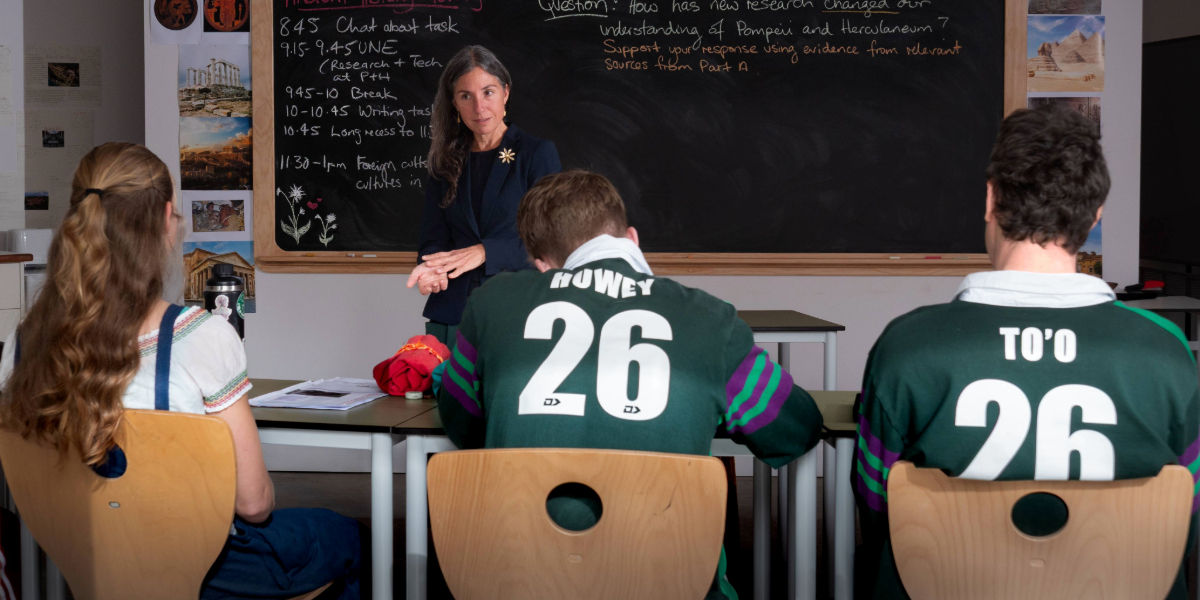A new partnership between The Armidale Waldorf School and the University of New England is helping senior students explore future possibilities by connecting them with academics whose careers are driven by passion and purpose.
The Visiting Academics Program is a key initiative of Armidale’s newest senior school, which opened this year after the biggest expansion in the Steiner school’s 40-year history. It gives Year 11 and 12 students face-to-face access to UNE researchers and academics, who visit the classroom to share the stories behind their work and the ideas that excite them.
“In a small country town, students might be limited in who they meet and the careers they are exposed to, and that can limit a student’s thinking about the career options available to them,” said Camilla DuBois, Senior Years Coordinator at The Armidale Waldorf School.
“By meeting academics from various disciplines — historians, palaeontologists, experts in Latin or turtles – students see pathways into the world that they might never have otherwise considered.”
The program is designed to complement formal learning by providing students with a deeper sense of purpose and engagement. Rather than delivering subject content, the academics talk about what inspires them in their fields and why their work matters.
“The important thing to impart to students is that this knowledge that they’re encountering is a lived experience. People make their lives working within these disciplines,” Camilla said.
“I think if you can convey that to adolescents, then they are genuinely learning – even if they only understand part of what’s being discussed.”
The idea was developed through conversations between Camilla and Associate Professor Melanie Fillios, UNE’s Director of Place Based Education and Research.
“We hope this partnership will provide school students with connections to experts who may be able to inspire the next generation of innovators,” said Associate Professor Fillios.
“We have some truly amazing educators at UNE. Partnerships like this enable them to take their knowledge beyond the university and put it to work in the rising generations of the regional communities we serve.”
The senior school was established in response to student demand, with many reluctant to leave the Steiner system for more traditional schools in their final years. Camilla said students feared losing the excitement and depth of learning they had experienced in earlier years.
“They told us that their greatest fear about going to another school for their final years was the deadening effect of those exam cram years – they wanted to stay as excited about learning as they had been in their earlier years here.”
The Visiting Academics Program is part of what Camilla describes as “a layered posture towards engaging with the community”. The first layer involves direct interaction with experts, while the second invites students to reflect on why particular knowledge is important and to whom.
“When you start considering these questions, you introduce students to a range of versions of adulthood that they can imagine themselves in, at a time when they are starting to crystallise their own sense of identity,” she said.
The school hopes to inspire students not only to see university as a possibility, but to appreciate the intellectual and emotional rewards that can come from pursuing knowledge, regardless of the career path they choose.
In recent months, Ancient History students have heard from Dr Sarah Lawrence on Roman games, Associate Professor Fillios on the display of human remains, and Dr Matthew Dillon on women in ancient Greece and Rome. Dr Alina Kozlovski also led a tour of UNE’s Museum of Antiquities.
Earth and Environmental Science students have met with soil scientist Dr Ivanah Oliver, learned about the endangered Bells turtle from Associate Professor Deborah Bower, and heard from paleobiologist Dr Nicolás Campione on reconstructing extinct species.
From Term 4, the focus of the program will shift to Society and Culture, Business Studies, and English.
“Each academic only does an hour and a half in this program each year,” said Camilla.
“We’re not asking them to take on the teaching burden for us. This is a heartfelt appeal to people with knowledge to come and explain why this knowledge matters to them, and to the world, and why it might matter to our students.”
Something going on in your part of the New England people should know about? Let us know by emailing newsdesk@netimes.com.au

